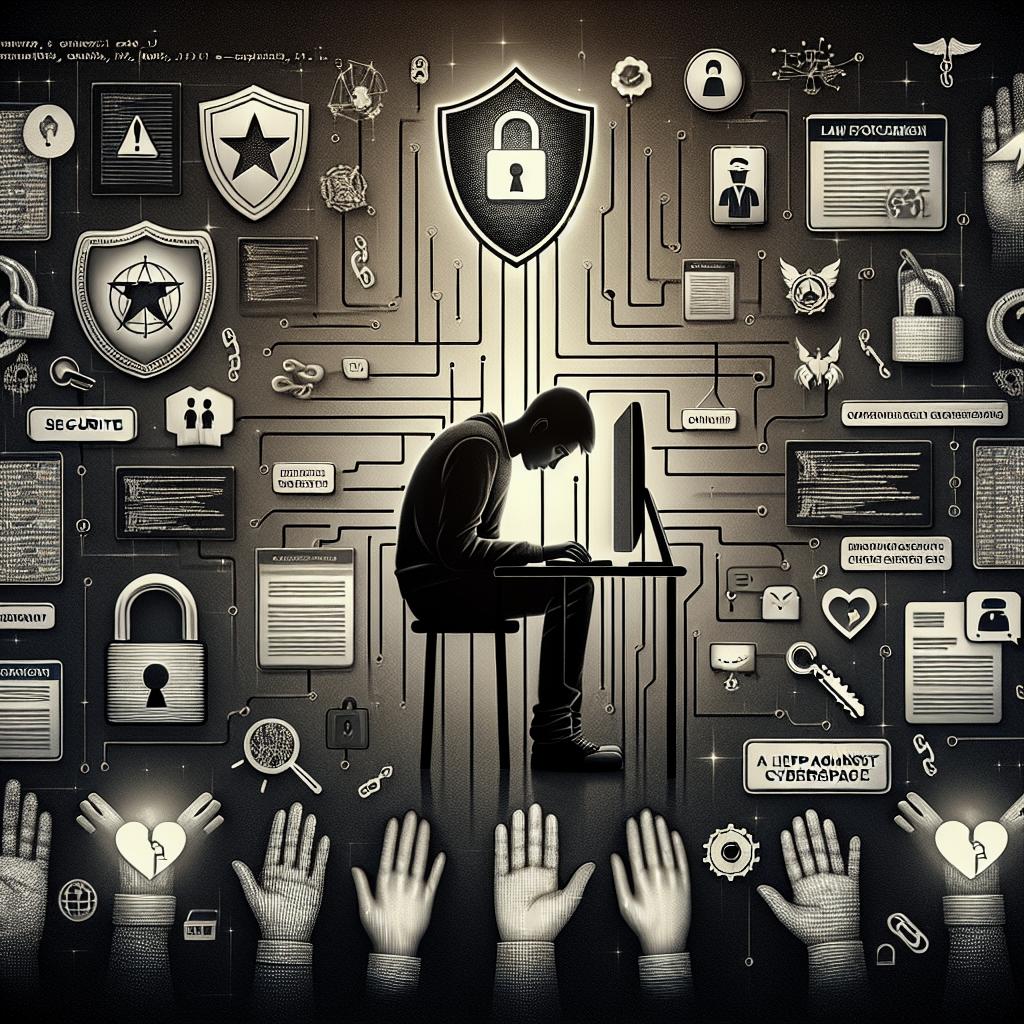“`html
Empowering Cybercrime Victims: Navigating Available Resources
In the increasingly digital world, cybercrime is a growing concern, affecting individuals and organizations alike. Whether it’s identity theft, fraud, or online harassment, victims may feel powerless against these unseen threats. Fortunately, a range of resources is available to help victims navigate their options, providing support and actionable strategies to reclaim their digital safety. This blog explores these resources, from government initiatives to specialized associations, offering guidance for anyone affected by cybercrime.
Stop.Think.Connect.
The Stop.Think.Connect. campaign is a critical national awareness initiative designed to increase the understanding of cybersecurity threats and teach safer online behavior. This program is a part of the U.S. Department of Homeland Security’s efforts to enhance public knowledge and reduce cyber vulnerabilities. The campaign offers resources that guide individuals, families, and businesses towards more secure digital habits, helping prevent potential cyberattacks before they occur.
By providing practical tips and customizable presentations, Stop.Think.Connect. equips users to safeguard their personal information and recognize suspicious activity. The campaign also emphasizes collaboration among the public and private sectors, encouraging continuous dialogue to bolster collective cybersecurity resilience.
DHS Fusion Centers
DHS Fusion Centers play a pivotal role in sharing threat-related information among federal, state, and local government partners. These centers are instrumental in analyzing cybersecurity threats and ensuring a coordinated response. For victims of cybercrime, Fusion Centers can act as a liaison, connecting them with appropriate resources and law enforcement agencies.
With the capability to pool insights from multiple jurisdictions, Fusion Centers are adept at identifying emerging trends and distributing relevant alerts to keep communities informed. Victims benefit from this vast network, receiving targeted information and resources needed to combat specific cyber threats they face.
FBI Field Offices
The FBI Field Offices are strategically located across the United States to provide comprehensive coverage against cybercrime on a national scale. These offices serve as a point of contact for victims seeking immediate assistance and are equipped with specialized teams to handle cybercrime investigations.
With the Cyber Division situated within the FBI, victims gain access to advanced technical skills and resources designed to track down cybercriminals. Moreover, victims are encouraged to report incidents via the FBI’s Internet Crime Complaint Center (IC3), where their cases can be analyzed for patterns to prevent further criminal activities.
High Technology Crime Investigation Association (HTCIA)
The HTCIA is a professional organization focused on the prevention and investigation of high-tech crimes. By promoting collaboration among security experts, the HTCIA supports victims through education, training, and networking opportunities.
Members of HTCIA include investigators from various sectors, providing victims with access to a breadth of knowledge and resources. Additionally, through workshops and conferences, the association aims to foster a community dedicated to advancing the fight against cybercrime.
InfraGard
InfraGard is a partnership between the FBI and the private sector designed to strengthen the nation’s critical infrastructures. This program facilitates the exchange of information and collaboration with business professionals to enhance cybersecurity defenses.
Victims of cybercrime benefit from InfraGard’s extensive network, gaining insights and support from a diverse pool of experts. Regular meetings and information sessions enable members to stay informed of the latest cyber threats and tactics to mitigate them effectively.
International Association of Computer Investigative Specialists (IACIS)
The IACIS is a globally recognized body that specializes in computer forensic skills and credentialing for investigators. As a victim of cybercrime, turning to specialists certified by IACIS can offer efficient and thorough investigations into breaches or data theft.
By providing certification programs, such as the Certified Forensic Computer Examiner (CFCE) program, IACIS ensures a high standard of expertise among its members. This support adds an essential layer of assurance for victims seeking knowledgeable professionals to handle their cases.
International Association of Crime Analysts (IACA)
The IACA is a forum focused on the advancement of crime analysis, including the sphere of cybercrime. For victims, the association provides access to a wealth of knowledge and strategies to better understand and combat various forms of cyber offenses.
Through conferences, training sessions, and publications, IACA members work to improve methodologies for crime analysis, thus enhancing the support system for victims seeking data-driven insights into cyber threats.
Internet Crimes Against Children Task Force (ICAC)
The ICAC Task Force is a national network composed of 61 coordinated task forces dedicated to investigating and prosecuting child exploitation crimes. Victims of such offenses, particularly children and their guardians, benefit from the resources and specialized expertise offered by these task forces.
Beyond enforcement, ICAC focuses on prevention and education, disseminating resources that help guardians and educators recognize signs of exploitation and protect children from online predators.
Multi-State Information Sharing & Analysis Center (MS-ISAC)
The MS-ISAC serves as a central resource for cyber threat prevention, protection, response, and recovery for U.S. state, local, tribal, and territorial (SLTT) governments. This resource empowers victims of cybercrime, especially those affiliated with SLTT organizations, with tools and guidelines to manage cyber incidents effectively.
By facilitating communication across these diverse jurisdictions, MS-ISAC contributes to a collaborative defense strategy, providing timely alerts, reports, and access to cybersecurity experts capable of offering direct assistance to victims.
NW3C
The National White Collar Crime Center (NW3C) focuses on training law enforcement agencies in methods to address economic and cyber crimes. Victims of such crimes can find solace as NW3C offers robust resources to agencies that work directly with affected individuals and entities.
Through workshops and specialized training, NW3C enhances the skills of cybercrime investigators, indirectly benefiting victims through improved response and recovery tactics, as well as heightened awareness of threats.
IACP
The International Association of Chiefs of Police (IACP) is committed to advancing public safety across global communities, including the realm of cybercrime. For victims, IACP’s resources and policies help address cyber threats through improved law enforcement practices and technology usage.
With various committees dedicated to tech-led initiatives, IACP aids in crafting a coherent response to cybercrime, thereby supporting victims with procedures that streamline reporting, investigation, and protection processes.
SEARCH
SEARCH is a non-profit organization dedicated to improving the justice and public safety community’s use of information through technology and research. Victims of cybercrime can benefit from SEARCH’s innovative projects and resources that promote cybersecurity resilience.
Offering webinars, technical assistance, and a knowledge base, SEARCH empowers victims to leverage technology intelligently, ensuring a more effective response to cyber incidents and contributing to overall digital safety improvements.
Regional Computer Forensics Laboratories (RCFLs)
The RCFL program comprises a network of specialized digital forensics labs dedicated to examining digital evidence in support of law enforcement investigations. Victims of cybercrime can count on RCFLs for their expertise in handling complex data and recovering crucial evidence.
This collaboration between different jurisdictions and agencies ensures that victims benefit from the most comprehensive and advanced forensic services available, paving the way for successful prosecution of cybercriminals.
Cybercrime Prevention Training
Cybercrime prevention training is pivotal in empowering victims with knowledge to protect themselves against future threats. Numerous institutions, university programs, and online platforms offer training courses focusing on cybersecurity essentials to advanced threat detection.
Victims, whether individuals or businesses, can enroll in these programs to gain the necessary skills to safeguard their digital assets. By staying informed about the latest cybercrime trends and prevention tactics, victims can become proactive in managing their digital footprints effectively.
Next Steps
| Resource | Description |
|---|---|
| Stop.Think.Connect. | A national campaign promoting cybersecurity awareness. |
| DHS Fusion Centers | Coordinates threat information sharing across government partners. |
| FBI Field Offices | Provides specialized cybercrime support and investigation. |
| HTCIA | Facilitates high-tech crime prevention and investigative collaboration. |
| InfraGard | Strengthens cyber defenses through public-private sector partnerships. |
| IACIS | Offers professional certification for computer forensic investigations. |
| IACA | Advances crime analysis, including cyber threats. |
| ICAC | A network dedicated to stopping child exploitation crimes. |
| MS-ISAC | Central resource for cyber threat information sharing across SLTT bodies. |
| NW3C | Trains agencies in addressing white-collar and cyber crimes. |
| IACP | Improves public safety practices to combat cybercrime. |
| SEARCH | Enhances justice community’s tech usage for cybersecurity. |
| RCFLs | Specialized labs providing digital forensic expertise. |
| Cybercrime Prevention Training | Empowers victims with preventive knowledge and skills. |
“`


